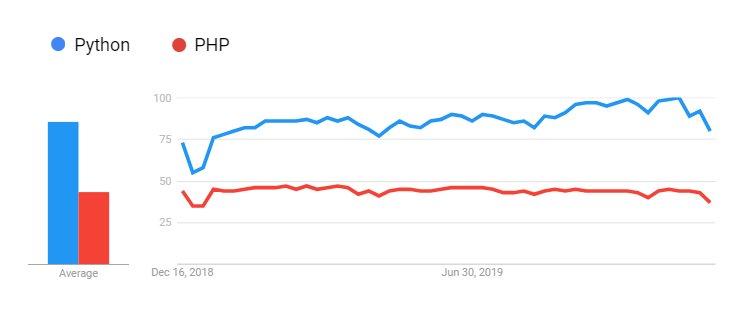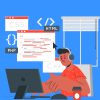According to PYPL, the PopularitY of Programming Language Index, Python’s share constitutes 29.71% leaving PHP with its 6.32% far behind. This index is based on how often language tutorials are searched on Google. Google Trends shows a similar figure over the past 12 months.

PHP vs Python, Google searches over the past 12 months
We refuse to make any conclusions relying solely on the collective wisdom of Internet users. In this article, we’ll dig deeper into the fundamental question: Python vs PHP for web development.
Python vs PHP profiles
Here are quick key facts you need to know about the two languages. No comparison yet — let’s just see who the contestants are in the PHP vs Python battle.
Python
- Was released in late 1991.
- Was named after a popular comedy show called ‘Monty Python’s Flying Circus’.
- Is a high-level object-oriented programming language.
- Is an open-source language.
- Has built-in data structures, combined with dynamic typing and binding.
- Allows system modularity and code reuse by offering support for modules and packages.
PHP
- Was introduced in 1994.
- Stands for Hypertext Pre-processor.
- Is a server-side scripting language.
- Can easily integrate with all major web servers on all major operating systems.
What we compare
Let’s move on to the criteria to be considered by any software engineer choosing a programming language. There will be 7 rounds. After each round, we’ll announce the winner and finally will see who is who in the language war.
Rounds:
- Ease of installation
- Ease of learning
- Library management
- Application speed
- Community support
- Choice of web frameworks
- Debugging
Round 1: Ease of installation
The first thing to do with the language is to install it on your computer. You probably expect installation to be cheap and easy-breezy on Windows, OS X, and Linux. If so, PHP is your go-to.
Python is a tougher nut to crack. Unless your OS is Linux, the installation will take a bit of extra work. If your OS is Windows, use a Windows package manager like Chocolatey, Windows Remix, or Scoop. If you use OS X, there’s an already pre-installed version of the language. But it is outdated for application development, and you’ll need to install a new one. Of course, you can try to do away with installing new packages only, but this won’t guarantee you get a stable system.
And the winner in this round is… PHP.
Round 2: Ease of learning
Neither of the contestants is similar to other C-style languages, which makes them harder to learn.
For example, in PHP, you use the -> operator to indicate a method called on an object and mark all the variables with a $ sign; while in Python, you are encouraged to use iterators for everything and get rid of curly braces.
PHP is rather old, so there are a lot of outdated materials that will impede your progress in the beginning. Python requires to know which tool to use for a specific job. What’s more, Python 2 to Python 3 transition has not been backward compatible.
And the winner in this round is…
No winners. Learning is not a walk in the park.
Round 3: Library management
We have a clear winner here: Mr. Python. Its Library Management System is a simple project containing only the Admin Side that manages everything for almost all types of applications. Especially the ones backed by Machine Learning. There are special ML libraries, such as Kiera’s, TensorFlow, and Theano, which smoothly integrate with web frameworks.
And the winner in this round is… Python.
Round 4: Application speed
In Python vs PHP speed contest, one of the languages also breaks forth. Guys from the PHP team, well done! With every new PHP version, the speed was getting a little bit faster, and PHP 7 has finally got a competitive edge over Python.
However, there’s a downside. If you work on an application that shares resources across requests, PHP may not be the best option for you as it has a nasty tendency to restart the entire app every time a web request starts. In this case, Python vs PHP performance contest is won by Python.
Please, remember that in most cases the app performance is not related to a programming language. If you have an overload of network queries or a lot of information read from a disk, don’t get surprised that your application is super slow. And don’t blame the language.
And the winner in this round is…
PHP in most cases. And let’s give Python a chocolate medal.
Round 5: Community support
Bugs happen, and a great way to find help, both psychological and technical, is to address the community. PHP is 3 years older than Python, so logically, there should be a wider community. But let’s remember about the PYPL Index. More and more Internet users learn Python, so the community is developing faster.
So the winner in this round is…
Both languages have great community support.
Round 6: Available web frameworks
Both languages boast a selection of excellent frameworks. For example, scalable and robust Django, Flask, Pylons, and Pyramid in Python. Secure and easy-to-use Codeigniter, Zend, Laravel, and Symfony in PHP.
No winner here as well. Or to be exact, both are winners.
Round 7: Debugging
Both languages have debuggers. Both tools are great. For Python, it’s well documented and very creatively named Python Debugger (PDB). For PHP, it’s a tool called XDebug. Both debuggers have a standard set of commonly used debugging features, including breakpoints, stacks, and path mapping.
Sorry, guys. No one has won here as well.
The final score
So what do we have in the end? PHP – 2 points (one is unclear). Python – 1 clear point (and one unclear).
Here’s the final comparison table: 
As you can see, a language perfectly working in one web development project may be lagging behind in another. If you are uncertain which option suits your project best, contact our team for a consultation.
For now, here’s what we would recommend:
- If you are a senior PHP developer, continue your journey with this language. There’s always room for improvement and not so many experienced professionals in the market.
- If you are an intermediate or junior developer, there’s a chance for you to get higher salaries if you shift to Python. However, If you have PHP-experienced team members, you can learn a lot faster from interaction with them and become a highly qualified PHP developer yourself.
- And some technical advice: if your job requires sharing environments on one PC and your app needs great Unicode support, choose Python.





